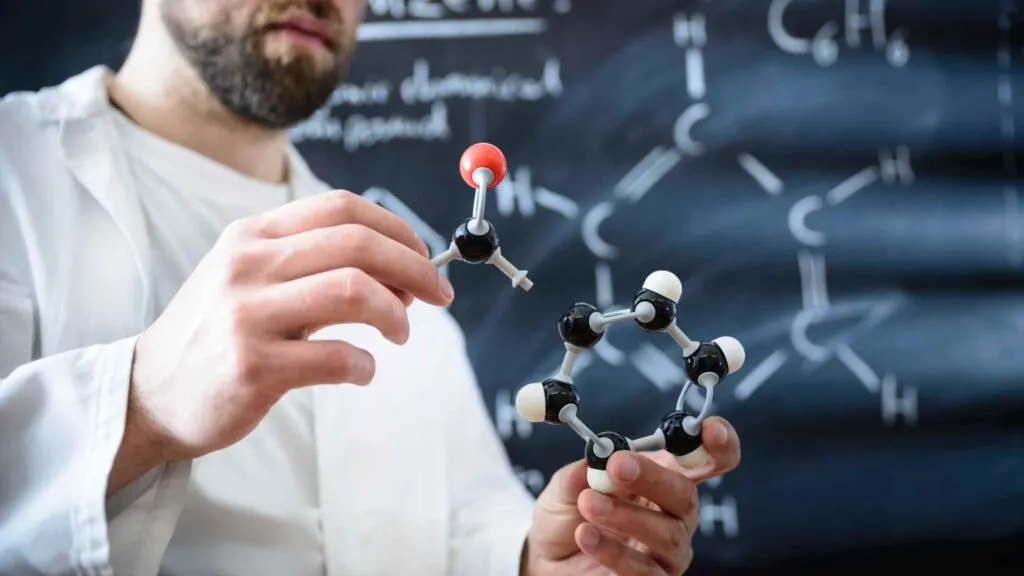Dive into the fascinating world of science with these 225 trivia questions! Test your knowledge across various fields, from biology to physics.
Perfect for quiz nights, classrooms, or curious minds. Are you ready to explore the wonders of science and prove your expertise?
Biology Wonders
Explore the mysteries of life with these thought-provoking biology trivia questions.
- What is the powerhouse of the cell? Answer: Mitochondria
- Which gas do plants primarily absorb from the atmosphere? Answer: Carbon dioxide
- What is the process called where plants convert sunlight into energy? Answer: Photosynthesis
- Which blood type is known as the universal donor? Answer: O-negative
- What part of the brain controls balance? Answer: Cerebellum
- How many chromosomes do humans have? Answer: 46
- What is the largest organ in the human body? Answer: Skin
- What is the basic unit of life? Answer: The cell
- Which type of blood vessel carries blood away from the heart? Answer: Arteries
- What molecule carries genetic information? Answer: DNA
- Which organ is responsible for detoxifying chemicals and metabolizing drugs? Answer: Liver
- What is the term for animals that feed on plants? Answer: Herbivores
- What pigment gives plants their green color? Answer: Chlorophyll
- How many hearts does an octopus have? Answer: Three
- Which is the smallest bone in the human body? Answer: Stapes
- What do we call the study of fungi? Answer: Mycology
- What is the main function of red blood cells? Answer: To carry oxygen
- Which part of a plant anchors it in the soil? Answer: Roots
- How many pairs of ribs are in the human body? Answer: 12
- What is the name of the process by which cells divide? Answer: Mitosis
- Which organelle is responsible for protein synthesis? Answer: Ribosome
- What type of muscle is found in the heart? Answer: Cardiac muscle
- What type of organism thrives in extreme environments? Answer: Extremophiles
- Which part of the human eye controls how much light enters? Answer: Iris
- What term describes the variety of life on Earth? Answer: Biodiversity
- Which bird is known for its ability to mimic sounds? Answer: Lyrebird
- What structure in plants is responsible for transporting water? Answer: Xylem
- Which vitamin is produced when skin is exposed to sunlight? Answer: Vitamin D
- What is the study of animals called? Answer: Zoology
- Which part of the brain is involved in memory? Answer: Hippocampus
- What is the largest land animal? Answer: African Elephant
- How many bones are in an adult human body? Answer: 206
- Which gland produces insulin? Answer: Pancreas
- What is the most abundant element in the human body? Answer: Oxygen
- What type of blood cells help in clotting? Answer: Platelets
- What is the term for the change of a caterpillar into a butterfly? Answer: Metamorphosis
- Which animal is known as the “king of the jungle”? Answer: Lion
- What type of joint is the shoulder? Answer: Ball and socket joint

Earth and Space Exploration
Delve into the marvels of our planet and the cosmos with these trivia questions.
- What is the largest planet in our solar system? Answer: Jupiter
- Which planet is known as the “Red Planet”? Answer: Mars
- How long does Earth take to orbit the Sun? Answer: 365.25 days
- What is the name of Earth’s largest ocean? Answer: Pacific Ocean
- What is the hottest planet in our solar system? Answer: Venus
- Which planet has the most moons? Answer: Saturn
- What is the Earth’s core primarily made of? Answer: Iron and nickel
- What is the name of the galaxy we live in? Answer: Milky Way
- Which layer of the Earth is liquid? Answer: Outer core
- What is the tallest mountain on Earth? Answer: Mount Everest
- Which gas is most abundant in Earth’s atmosphere? Answer: Nitrogen
- What is the name of the first artificial satellite? Answer: Sputnik
- How old is the Earth estimated to be? Answer: About 4.5 billion years
- What phenomenon causes the Northern Lights? Answer: Solar wind interacting with Earth’s atmosphere
- Which country was the first to land a man on the Moon? Answer: USA
- What is the term for a meteoroid that hits Earth’s surface? Answer: Meteorite
- What is the smallest planet in the solar system? Answer: Mercury
- What is the primary cause of ocean tides? Answer: Moon’s gravitational pull
- What is the second largest planet in our solar system? Answer: Saturn
- How many planets are in our solar system? Answer: Eight
- What is the study of stars called? Answer: Astronomy
- Which planet is known for its rings? Answer: Saturn
- What is the name of NASA’s most famous space telescope? Answer: Hubble
- What is a supernova? Answer: An exploding star
- What is the largest desert on Earth? Answer: Antarctic Desert
- What is the speed of light? Answer: 299,792 kilometers per second
- What percentage of Earth is covered in water? Answer: About 71%
- What do we call the study of Earth’s physical structure? Answer: Geology
- Which planet has a day longer than its year? Answer: Venus
- What is the brightest star in the night sky? Answer: Sirius
- Which two elements make up water? Answer: Hydrogen and oxygen
- What is the closest star to Earth? Answer: The Sun
- What is the main gas found in the Sun? Answer: Hydrogen
- What is the Earth’s natural satellite? Answer: The Moon
- What is the term for molten rock below Earth’s surface? Answer: Magma
- What is the deepest point in Earth’s oceans? Answer: Mariana Trench
- Which layer of Earth’s atmosphere contains the ozone layer? Answer: Stratosphere
- What do we call a group of stars forming a pattern? Answer: Constellation

Chemistry Conundrums
Get ready to mix things up with fascinating chemistry trivia questions!
- What is the chemical symbol for gold? Answer: Au
- What is the most abundant gas in the universe? Answer: Hydrogen
- What element is known as the “king of chemicals”? Answer: Sulfur
- What is the chemical formula for water? Answer: H₂O
- What gas do humans exhale during respiration? Answer: Carbon dioxide
- Which acid is found in the stomach? Answer: Hydrochloric acid
- What element is used in pencils? Answer: Carbon (graphite)
- What is the hardest natural substance on Earth? Answer: Diamond
- What is the pH level of pure water? Answer: 7
- What is the process called when a solid turns directly into a gas? Answer: Sublimation
- What does NaCl stand for? Answer: Sodium chloride (table salt)
- Which element is known as a noble gas? Answer: Helium
- What is the study of matter and its interactions called? Answer: Chemistry
- What is the chemical symbol for silver? Answer: Ag
- What element is commonly used in thermometers? Answer: Mercury
- Which element has the atomic number 1? Answer: Hydrogen
- What is the lightest element on the periodic table? Answer: Hydrogen
- What element is used in the production of nuclear energy? Answer: Uranium
- What is the process by which plants absorb nitrogen called? Answer: Nitrogen fixation
- Which gas is known as “laughing gas”? Answer: Nitrous oxide
- What element is a major component of bones? Answer: Calcium
- What is the common name for acetic acid? Answer: Vinegar
- What type of bond involves sharing of electrons? Answer: Covalent bond
- What does the term “organic chemistry” refer to? Answer: The study of carbon-containing compounds
- What is the molar mass of water? Answer: 18 g/mol
- What is the chemical symbol for potassium? Answer: K
- Which element is liquid at room temperature? Answer: Mercury
- What is the primary component of natural gas? Answer: Methane
- What is the most reactive element on the periodic table? Answer: Fluorine
- What is the term for a substance that speeds up a chemical reaction? Answer: Catalyst
- What is the chemical symbol for lead? Answer: Pb
- What does pH stand for? Answer: Potential of hydrogen
- What element is commonly used in batteries? Answer: Lithium
- What is the main ingredient in soap that cleans? Answer: Sodium or potassium salts of fatty acids
- Which element is known for its yellow-green gas and strong odor? Answer: Chlorine
- What does CO₂ stand for? Answer: Carbon dioxide
- What type of reaction releases heat? Answer: Exothermic
- What is the study of the rates of chemical reactions called? Answer: Chemical kinetics
- What is the atomic number of oxygen? Answer: 8
Physics Phenomena
Uncover the forces and principles that govern our universe with these physics trivia questions!
- What is the SI unit of energy? Answer: Joule
- What is the speed of sound in air? Answer: Approximately 343 m/s
- What is the term for the bending of light? Answer: Refraction
- Who formulated the laws of motion? Answer: Isaac Newton
- What does E=mc² stand for? Answer: Energy equals mass times the speed of light squared
- What is the unit of electric current? Answer: Ampere
- What is the phenomenon where light behaves as both a wave and a particle? Answer: Wave-particle duality
- What type of lens is used to correct nearsightedness? Answer: Concave lens
- What is the SI unit of power? Answer: Watt
- What is the term for materials that resist the flow of electric current? Answer: Insulators
- What is the acceleration due to gravity on Earth? Answer: 9.8 m/s²
- What is the measure of the amount of matter in an object? Answer: Mass
- What type of wave is sound? Answer: Longitudinal wave
- What does a voltmeter measure? Answer: Voltage
- What is the SI unit of resistance? Answer: Ohm
- What is the first law of thermodynamics? Answer: Energy cannot be created or destroyed
- What is the device used to measure atmospheric pressure? Answer: Barometer
- What type of mirror is used in car side mirrors? Answer: Convex mirror
- What is the principle behind a rocket’s motion? Answer: Newton’s third law (action and reaction)
- What is the term for the force that opposes motion between two surfaces? Answer: Friction
- Who is known as the father of electromagnetism? Answer: Michael Faraday
- What is the term for a closed loop in which electricity flows? Answer: Circuit
- What happens to a gas when it is compressed? Answer: Its pressure increases
- What is the term for the distance between two wave peaks? Answer: Wavelength
- What is the process of splitting a nucleus called? Answer: Nuclear fission
- What is the unit of frequency? Answer: Hertz
- What is the force that pulls objects toward the center of the Earth? Answer: Gravity
- What is the principle of buoyancy called? Answer: Archimedes’ principle
- What does a prism do to light? Answer: It disperses light into its spectrum
- What is the phenomenon where light bounces off a surface? Answer: Reflection
- What is the term for an object’s resistance to change in motion? Answer: Inertia
- What is the unit of magnetic flux? Answer: Weber
- What is the study of heat and temperature called? Answer: Thermodynamics
- What is the term for the force per unit area? Answer: Pressure
- What is the smallest unit of a compound? Answer: Molecule
- What is the force that acts against an object’s motion through the air? Answer: Air resistance
- What is the name of the quantum particle that carries the electromagnetic force? Answer: Photon
- What is the study of subatomic particles called? Answer: Particle physics

Bonus Science Trivia Questions
Enjoy these extra science trivia questions spanning all categories for even more fun!
- What is the smallest particle of an element? Answer: Atom
- What is the name of the only metal that is liquid at room temperature? Answer: Mercury
- What planet is known as the “Morning Star”? Answer: Venus
- What is the most abundant metal in the Earth’s crust? Answer: Aluminum
- What does DNA stand for? Answer: Deoxyribonucleic acid
- What gas is commonly used in balloons to make them float? Answer: Helium
- What is the hottest part of the Earth? Answer: Inner core
- Who developed the theory of evolution by natural selection? Answer: Charles Darwin
- What type of rock is formed by volcanic activity? Answer: Igneous rock
- What is the SI unit of temperature? Answer: Kelvin
- What do you call the study of the weather? Answer: Meteorology
- What is the process where water changes from a liquid to a gas? Answer: Evaporation
- What is the hardest naturally occurring mineral? Answer: Diamond
- What is the name of the organ that produces bile? Answer: Liver
- What element has the highest melting point? Answer: Tungsten
- What is the study of the interaction between living things and their environment called? Answer: Ecology
- What is the main gas responsible for the greenhouse effect? Answer: Carbon dioxide
- What is the basic building block of proteins? Answer: Amino acids
- What planet has the Great Red Spot? Answer: Jupiter
- What part of the human body contains the smallest bones? Answer: Ear
- What is the SI unit of electric charge? Answer: Coulomb
- What is the term for animals that eat both plants and meat? Answer: Omnivores
- What do you call the force that opposes the motion of objects in contact? Answer: Friction
- What is the main organ of the respiratory system? Answer: Lungs
- What is the most common isotope of hydrogen? Answer: Protium
- What is the term for the study of insects? Answer: Entomology
- Which planet rotates on its side? Answer: Uranus
- What is the unit used to measure sound intensity? Answer: Decibel
- What is the name of the outer layer of the Earth? Answer: Crust
- What is the chemical symbol for iron? Answer: Fe
- What type of star is our Sun? Answer: Yellow dwarf
- What is the term for a celestial body that orbits a planet? Answer: Moon
- What is the largest organelle in a plant cell? Answer: Vacuole
- What is the name of the process that powers the Sun? Answer: Nuclear fusion
- What is the largest gland in the human body? Answer: Liver
- What is the study of the behavior and properties of light? Answer: Optics
- What is the most abundant element in the Earth’s crust? Answer: Oxygen
- What is the largest known type of star? Answer: Red supergiant
- What is the closest planet to the Sun? Answer: Mercury
- What is the study of fossils called? Answer: Paleontology
- What type of galaxy is the Milky Way? Answer: Spiral galaxy
- What is the term for the path of an object in orbit? Answer: Trajectory
- What is the most abundant mineral in the Earth’s crust? Answer: Feldspar
- What type of energy is stored in a stretched rubber band? Answer: Potential energy
- What is the chemical symbol for chlorine? Answer: Cl
- What type of cloud is associated with thunderstorms? Answer: Cumulonimbus
- What is the smallest unit of matter? Answer: Quark
- What is the term for the splitting of white light into its spectrum? Answer: Dispersion
- What is the SI unit for luminous intensity? Answer: Candela
- What is the most common element in the universe? Answer: Hydrogen
- What is the term for water droplets frozen into ice crystals in the atmosphere? Answer: Snow
